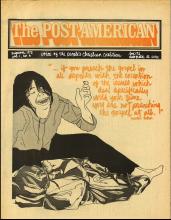I must confess that I have had to reconsider the whole issue of evangelism. As I have moved beyond liberalism and secular theology, it has become increasingly clear that the church does have a unique message and that it is legitimate to call alienated and lost people into the fellowship of the new creation. If the church does have a message that properly can be called “good news,” then it is inconceivable that the church would not be proclaiming that good news to our sick and dying world.
Christians are called to live in radical obedience to Jesus Christ, and to witness. But before we are able to witness, we must understand the meaning of discipleship. The immediate task is to begin to examine our faith and know what it is that we believe. We must know what the faith and message is that we would proclaim and witness to. We need to know what we believe and in whom we believe.
In addition to not being committed to the faith, an important reason for our lack of interest in evangelism lies in our misunderstanding of what witness means. Conservatives and liberals have both distorted evangelism. The conservatives have reduced witness and salvation into an individualistic saving of an inner soul, an emotional experience unrelated to political and social issues. This shallow understanding of salvation allows people to exclaim how thankful they are that Johnny “was saved” before he went to
Read the Full Article

